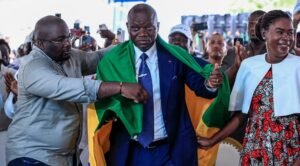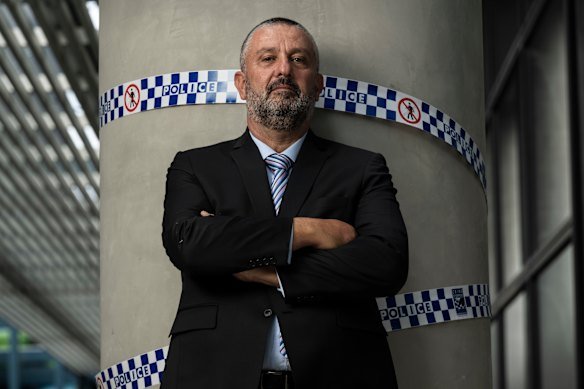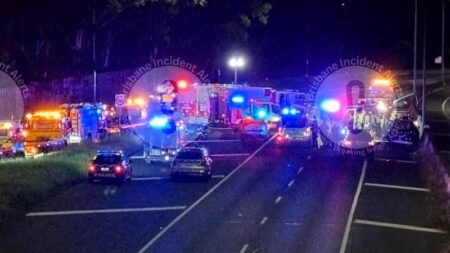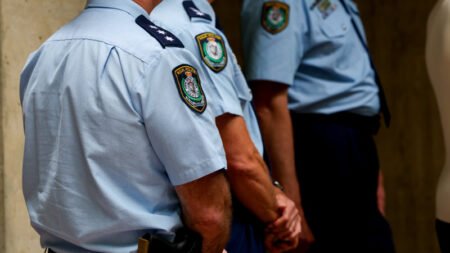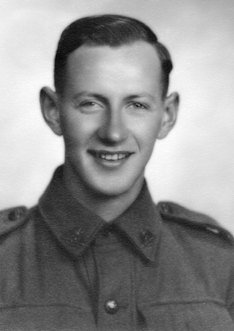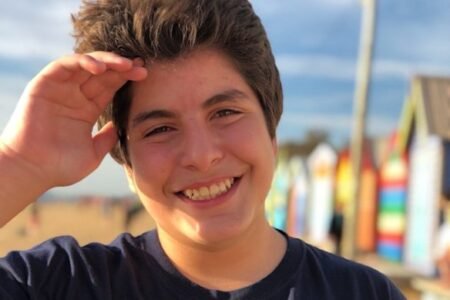Casting his mind back over more than three and a half decades as a police officer, Detective Superintendent Joe Doueihi can’t say exactly how many murder investigations he’s been involved in.
Sitting behind his desk in NSW Police’s Parramatta headquarters, he estimates it’s in the hundreds. The figure isn’t what’s important to him, however. It’s the people, the victims, it represents. That’s what he can conjure clearly in his mind.
“I remember every homicide I’ve been to,” Doueihi says.
He remembers the high-profile cases he’s worked – such as the murder of 18-year-old Lyndsay van Blanken, strangled to death by her ex-boyfriend and stuffed in a cricket bag beneath a Queens Park apartment building in November 2003 – as clearly as the murders that didn’t make the headlines.
There are significant cases that have left an “indelible impression” on him, but he prefers not to discuss them in detail or dwell on them. Instead, he is focused on the task at hand: succeeding in one of the most coveted roles in NSW Police.
Joe Doueihi remembers every one of the hundreds of murder investigations he’s been involved in as a police officer.Credit: Janie Barrett
On Monday, Doueihi, one of the state’s most experienced detectives, will take over as homicide squad commander from outgoing boss Danny Doherty, who retired last week after 40 years with NSW Police.
“It’s my ultimate dream,” Doueihi tells the Herald in his first interview since being appointed to the role.
“I never thought I’d be here [and] I am.”
For most of his 30-plus years as a detective, Doueihi, who has led the robbery and serious crime squad since December 2022, has repeatedly been drawn back to homicide. Since his first stint in homicide in 2000 he has worked at every rank in the squad.
Loading
“There’s no more satisfaction to a police officer than being able to put the handcuffs on an offender and telling that offender that they’re under arrest for the offence of murder,” Doueihi says.
“It’s enormous satisfaction both personally, and achieving something for family members of a deceased person is also something that I really have a passion for.”
Doueihi says the role is his “dream job”, but adds that his motivation as a detective has been, and always will be, achieving an outcome for victims and their families.
“I’m not there for the glory or because it’s a dream job, I’m there because it’s something I have a passion for,” he says.
“It’s doing a job for those people that are no longer here and can’t speak for themselves. We are their mouthpiece, and we do that by [doing] the jobs that the men and women of the homicide squad do.”
He shies away from the role he’s played in specific cases such as van Blanken’s murder, an investigation he led. Instead, he focuses on the outcome: a murder conviction and jail term for van Blanken’s killer, William Harold Matheson, who was released on parole in 2023 after 18 years’ imprisonment.
The cases linger long past a conviction, though. More than two decades after Doueihi laid cuffs on Matheson, he is still in touch with van Blanken’s mother, Cynthia Pleasance.

More than two decades after Lyndsay van Blanken’s murder, Doueihi is still in touch with her mother.
“Even with some resolution at the end of the day, it still doesn’t take away the grief and suffering,” he says.
“So if we can do our bit, and that’s putting those offenders before the court system, and bring … justice, well, that’s a good day for us.”
Reaching what is considered the pinnacle of investigative policing was never part of Doueihi’s plan. When he joined NSW Police in the late 1980s after earning a trade as a motor mechanic, it was solely to work in the force’s rescue squad.
After three rejections, and reluctant to leave Sydney for regional NSW, Doueihi tried his hand as a detective and “never looked back”.
In the late 1990s, Doueihi was recruited to Strike Force Lancer, an operation targeting Kings Cross drug kingpin Danny “DK” Karam and his gang, DK’s Boys, in what was his first taste of a major organised crime investigation as a junior detective.
Karam’s second-in-command, Michael Kanaan, was sentenced to life imprisonment in 2002 for the 1998 murder of his boss outside a Surry Hills home after Karam’s own gang turned on him.
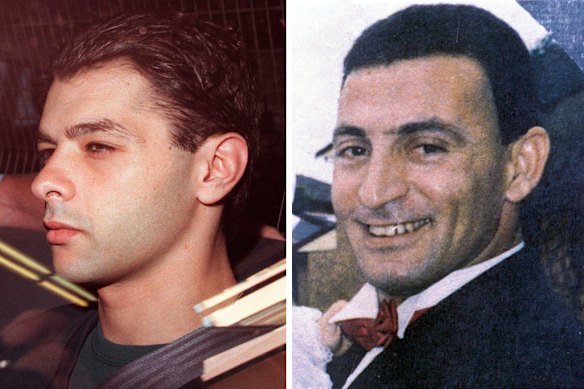
Michael Kanaan (left) was sentenced to life imprisonment for the 1998 gangland murder of his boss Danny Karam (right). The strike force targeting Karam was Doueihi’s first taste of a major organised crime investigation.Credit: Peter Rae/James Alcock
While Doueihi’s role in the strike force wasn’t as significant as that of Joe Dooley, the fictional police officer loosely based on him in the third season of the Underbelly television series, he says it was “quite a big job” early in his career.
By then, Doueihi had already come under scrutiny during the Wood royal commission into NSW Police, which exposed entrenched corruption throughout the force, particularly among detectives working the notorious glitter strip.
“It really was a terrible part of my career, what I had to endure back then,” Doueihi says.
“I was put under the microscope purely because I worked at Kings Cross and associated with other Kings Cross detectives. It certainly wasn’t a pleasant experience for me or my family and I wouldn’t wish it upon anyone.”
Overall, Doueihi says, the royal commission achieved its goal of exposing corruption, but it left behind “a lot of collateral damage at the time as well”.
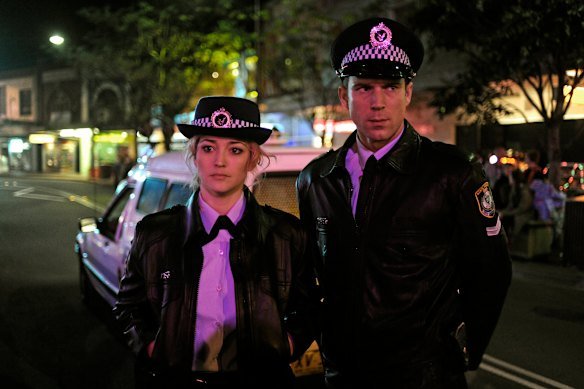
Fictional police officer Joe Dooley, played by Wil Traval (right) in the third season of the Underbelly series, was loosely based on Doueihi’s time in Kings Cross.Credit: Nine
Challenging, too, was combatting stereotypes around his Lebanese heritage, of which he is extremely proud, as Lebanese organised crime gangs on his beat ran rampant. He pursued those crooks even harder to prove a point.
When Doueihi takes the reins on Monday, he will inherit 53 active murder investigations, more than 140 staff and a squad reviewing all unsolved homicides in NSW in response to a landmark inquiry that found NSW Police failed to properly investigate dozens of potential gay hate crimes over 40 years. But Doueihi says the work under Taskforce Atlas will extend beyond that, while the homicide squad’s operating procedures are also being reviewed.
“We are not just reinvestigating or reviewing gay hate homicides, we’re reviewing all unsolved homicides and from those we will identify potentially what may require a reinvestigation,” he says.
Doueihi praised Doherty – an “excellent commander and leader” – who he says has left the homicide squad in good shape after doing a “fantastic job”.
Loading
While Doueihi takes over at a time of relative calm compared with the violence seen in Sydney’s cocaine-fuelled gang wars of the past few years, breaking the underworld’s code of silence remains the biggest hurdle to cracking the unsolved gangland murders that made his predecessor one of NSW Police’s most recognisable faces.
At 55, Doueihi considers himself years from retirement and ready to face the challenges that come with one of NSW Police’s highest profile jobs.
“I put my hand up for it, I’m ready for it, I’m willing to give it a crack and give it my best,” he says.
“The day I wake up in the morning and I say to myself, ‘Oh, I don’t feel like going to work’, it’s probably time to retire. I’ve been in the police now for 35 years-plus and that day still hasn’t come, and I still have that fire in the belly and I still look forward to coming to work every day.”
Get alerts on significant breaking news as happens. Sign up for our Breaking News Alert.
Read the full article here



